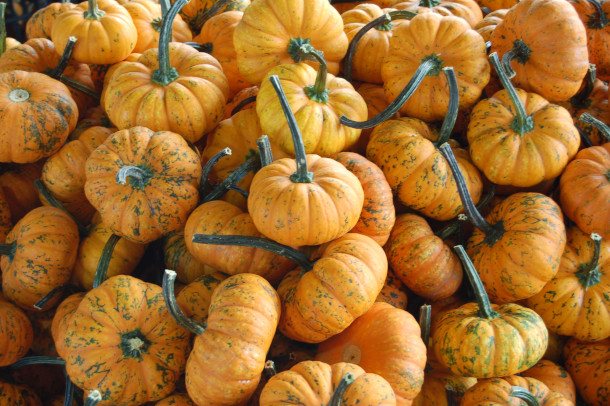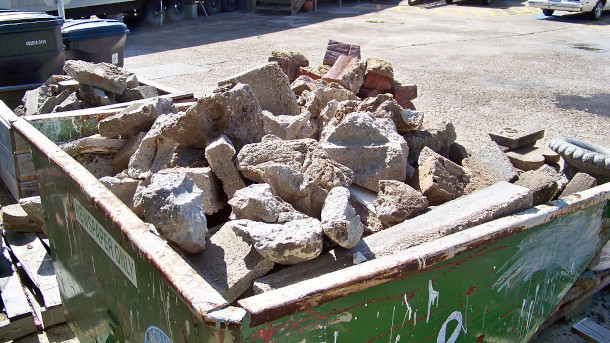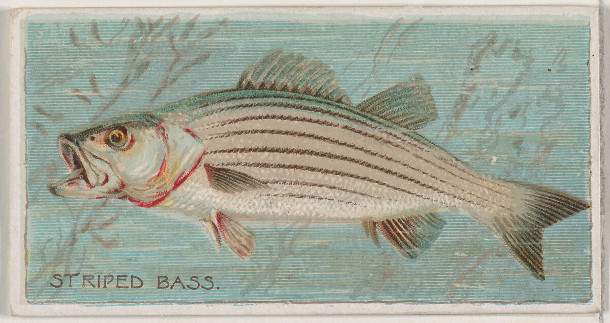Beyond the Headlines
Air Date: Week of November 3, 2023

New studies indicate that edible pumpkins could be a valuable crop in developing countries due to their nutritional value and climate resiliency. (Photo: Suzie Tremmel, Wikimedia Commons, CC BY 2.0)
This week, Living on Earth contributor Peter Dykstra and Host Steve Curwood discuss the nutritional value and relative ease of growing pumpkins. Also, the construction industry offers a huge opportunity to incorporate recycled materials. And in history, they look back to when Congress passed an act to protect the popular striped bass also called rockfish.
Transcript
DOERING: It’s Living on Earth I’m Jenni Doering.
CURWOOD: On the line now from Atlanta, Georgia is Peter Dykstra — Living on Earth contributor who looks beyond the headlines for us. And hi there, Peter, how you doing today?
DYKSTRA: Hi, Steve. I'm doing well. And I hope you are too. And why am I about to start talking about pumpkins, when it's already after Halloween? It’s because pumpkins are being viewed in the developing world as a potential superfood, low calorie, containing antioxidants containing vitamin C, vitamin A, a whole lot of other valuable things. They're easy to grow. They resist drought, they resist heat. And so pumpkins may be on the rise elsewhere for something other than the dreaded pumpkin spice.
CURWOOD: Although I have to confess that I do like pumpkin pie. So what's the research that tells us that pumpkins really, it would be a great deal for the less affluent part of the planet.
DYKSTRA: In 2021, a Malaysian University called pumpkins, a revolutionary age crop, after they did a study found they were a balanced food could grow almost anywhere.
CURWOOD: I have to say what I've had success with them in my garden, they almost take over the thing, so they can be fairly prolific.
DYKSTRA: Yeah. And when I tried to grow pumpkins in Georgia, even though a lot of people have great success around here, my pumpkins could not be seen by the naked eye.
CURWOOD: Hey, what else do you have today?
DYKSTRA: Recycling and the construction industry. In many places, it's widespread. If you want to get a green building certification in the United States, you have to use recycled material for a new building. But in all the new building that's going around the world, recycling isn't yet a thing. It's a huge contributor, all of those used and discarded construction materials, everything from wood, to metals to stone to concrete, are a huge source of carbon emissions. Replacing them with new stuff is another source of carbon emissions. Some say it's one in 10 tonnes of carbon emissions worldwide. And recycling is a way to cut that big chunk of what we're putting into the atmosphere putting into greenhouse gases by reforming the construction industry.

Although recycling building materials is common in wealthier countries, developing countries have a long way to go if they want to negate the impact of new construction on the climate. (Photo: Reuse Warehouse, Flickr, CC BY 2.0)
CURWOOD: So this sounds like this is a huge potential to help reduce climate changing gases, but so far not well used around the Earth.
DYKSTRA: Now, in some areas, it is in the US and Europe. It's becoming widespread in much of the developing world, there's still a long way to go in worldwide new construction, places where construction is booming, like some of the oil rich cities in the Middle East, to bring the industry up to meeting its goals in lessening a huge contribution to greenhouse gases.
CURWOOD: Hey, Peter, let's take a loo now, back in the history volumes, tell me what you see.
DYKSTRA: Oh, Steve, October 31, 984 would have been a red letter day for both rock fish and striped bass if those fish use letters.
CURWOOD: But wait rockfish and Stripe best, man, I think those are the same fish. Some people think right?
DYKSTRA: You got me. rock fish in Chesapeake Bay, striped bass and a lot of other places, including the Hudson River in New England, along the east coast. But 39 years ago, the Atlantic striped bass Conservation Act was passed by Congress signed by President Reagan in response to a serious crash in the catch totals for a fish that was popular with both sport and commercial fishermen.
CURWOOD: Yeah, and so what they imposed a moratorium or how did this work?
DYKSTRA: Five years striped bass and rock fish were off limits for catch that led to huge recovery.

Despite declining populations back in the 1980’s, the Striped Bass is now doing well in part due to the signing of the Atlantic Striped Bass Conservation Act. (Photo: Knapp & Company, The Metropolitan Museum of Art, Public Domain)
CURWOOD: Right where I am along the New England coast, striped bass are back in fairly large numbers. Although the limits are set that you can't get them too small. You can't get them too big. So it makes the sport fishermen throw back almost everything they catch, but when they get to keep one Peter, they taste so good. Well, hey, thanks, Peter. And the next time you chow down on a striped bass at the restaurant at a friend's house, just remember this Atlantic striped bass Conservation Act. Peter Dykstra is a contributor to Living on Earth. And we'll talk to you again real soon.
DYKSTRA: All right, Steve, thanks a lot. Talk to you soon.
CURWOOD: Thanks, Peter. And there's more on these stories on the Living on Earth webpage. That's loe.org.
Links
Learn more about how pumpkins are fighting poverty in the developing world.
Read a full report explaining the benefits of recycling and reusing construction materials.
Living on Earth wants to hear from you!
Living on Earth
62 Calef Highway, Suite 212
Lee, NH 03861
Telephone: 617-287-4121
E-mail: comments@loe.org
Newsletter [Click here]
Donate to Living on Earth!
Living on Earth is an independent media program and relies entirely on contributions from listeners and institutions supporting public service. Please donate now to preserve an independent environmental voice.
NewsletterLiving on Earth offers a weekly delivery of the show's rundown to your mailbox. Sign up for our newsletter today!
 Sailors For The Sea: Be the change you want to sea.
Sailors For The Sea: Be the change you want to sea.
 The Grantham Foundation for the Protection of the Environment: Committed to protecting and improving the health of the global environment.
The Grantham Foundation for the Protection of the Environment: Committed to protecting and improving the health of the global environment.
 Contribute to Living on Earth and receive, as our gift to you, an archival print of one of Mark Seth Lender's extraordinary wildlife photographs. Follow the link to see Mark's current collection of photographs.
Contribute to Living on Earth and receive, as our gift to you, an archival print of one of Mark Seth Lender's extraordinary wildlife photographs. Follow the link to see Mark's current collection of photographs.
 Buy a signed copy of Mark Seth Lender's book Smeagull the Seagull & support Living on Earth
Buy a signed copy of Mark Seth Lender's book Smeagull the Seagull & support Living on Earth

